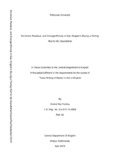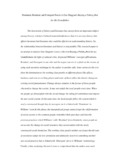Please use this identifier to cite or link to this item:
https://elibrary.tucl.edu.np/handle/123456789/2963| Title: | Dominant, Residual, and EmergentForces in Gao Xingjian's Buying a Fishing Rod for My Grandfather |
| Authors: | Pandey, Koshal Raj |
| Keywords: | Cultural materialism;Dominant;Residual;Emergent |
| Issue Date: | 2019 |
| Publisher: | Central Departmental of English |
| Abstract: | The interaction of history and literature has always been an important subject among literary scholars. Cultural materialismbelieves that it is not only history that affects literature but literature also could be effective in understanding history. So, the relationship between literature and history is inseparable. This research paper is an attempt to analyse Gao Xingjian’s story collection Buying a Fishing Rod for my Grandfatherin the light of cultural critic, Raymond Williams’ concepts ofDominant, Residual, and Emergent in one side and the major concern is to find out the reason of using such narrative technique by the author in another side. Some stories in this text show the domination to the working class people in different places like offices, business, and even at working places and some of them reflect the drastic changesin existing social phenomenon. Change always remains in the favour of those people who tend to change the society. It may not satisfy the local people every time. When the people get dissatisfied with the social change the ruling forcedominate and impose the new social system. At the same time, the local people follow the system which is newly constructed though they do not agree on it is linked with ‘Dominant’ in Williams’ term.In this phase, the marginalized group cannot forget the old formation of social system or the common people remember their past days and miss the previous practices which Williams’ calls ‘Residual’ force.Similarly, when people do not accept the change in social structure, they cannot adopt with the newly constructed social formation. The working class people neither can forget theold state of societynor adopt the new formation and ultimately search to something another new social practice that is linked with ‘Emergent’ force in Williams’ terminology. Finally, while analysing this text I come to comprehend that the author uses such narratives to show his dissatisfaction or to criticize the Cultural Movement, Great Proletariat Cultural Revolution, which had held in China during 1970s. Keywords: cultural materialism, dominant, residual, and emergent |
| URI: | http://elibrary.tucl.edu.np/handle/123456789/2963 |
| Appears in Collections: | English |
Files in This Item:
| File | Description | Size | Format | |
|---|---|---|---|---|
| Cover.pdf | 22.77 kB | Adobe PDF |  View/Open | |
| Chapter.pdf | 115.63 kB | Adobe PDF |  View/Open |
Items in DSpace are protected by copyright, with all rights reserved, unless otherwise indicated.
